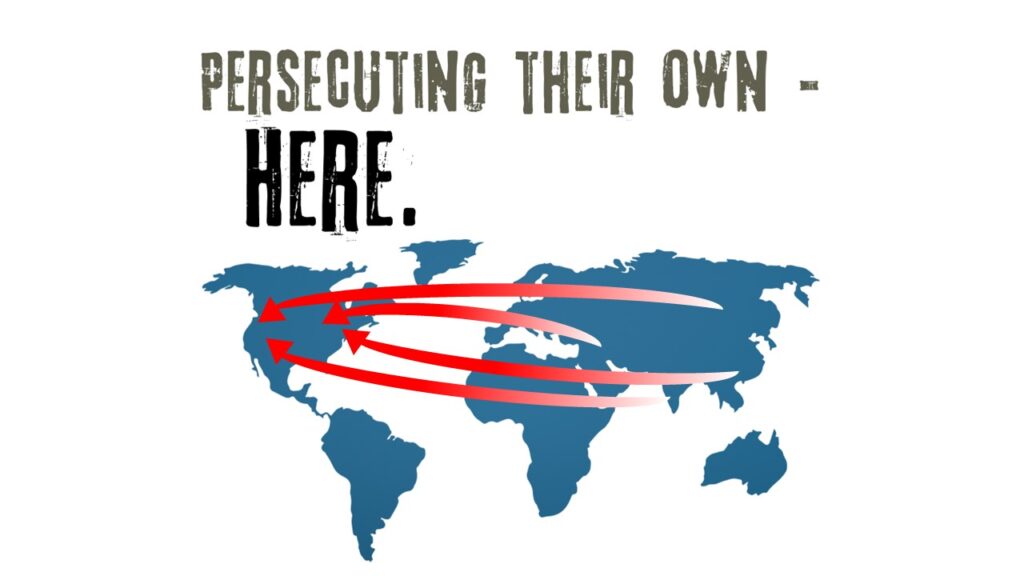
What is Transnational Repression?
Some countries’ governments harass and intimidate their own citizens living in the United States and other countries. These governments may also target naturalized or U.S.-born citizens with family overseas or other foreign connections. This practice, known as transnational repression, violates U.S. law and individual rights and freedoms.
Transnational repression may take the following forms:
- Stalking
- Harassment
- Hacking
- Physical assaults
- Attempted kidnapping
- Forcing or coercing the victim to return to the home country
- Threatening or detaining family members in the home country
- Freezing financial assets
- Online disinformation campaigns
Governments use transnational repression tactics to silence the voices of their citizens (or non-citizens connected to the country), force information from them, or coerce them to return home.
Foreign governments typically target:
- Political and human rights activists
- Dissidents
- Journalists
- Political opponents
- Religious or ethnic minority groups
China’s Transnational Repression of the Uyghurs
The Uyghurs, a Muslim minority living in China’s northwestern Xinjiang region, are one of the most persecuted groups in the world. They face systematic discrimination and persecution by the Chinese government, which is attempting to eradicate their culture and identity to consolidate China’s control over resource-rich Xinjiang. Over one million Uyghurs are estimated to be held in government-run internment camps, where they are subjected to mistreatment and torture.
China’s persecution of the Uyghurs does not stop at China’s borders. As many as 1.6 million Uyghurs reside outside of China, with major population centers across Central Asia, the Middle East, Europe, and North America. Through surveillance, infiltration, intimidation, harassment, extradition, and rendition, the Chinese government and the Chinese Communist Party (CCP) seek to terrorize overseas Uyghurs into political silence.
China and the CCP have increased their efforts to monitor and intimidate Uyghurs living on U.S. soil. This includes attempts to track individuals, monitor online activity, and pressure Uyghurs living in the US to remain silent about the human rights abuses perpetrated against their communities in the Xinjiang region, as well as to assent to Chinese government policies. Such transnational repression violates international human rights standards and domestic laws and undermines the values of freedom, openness, and democracy in the US.
World Without Genocide’s Report: “Transnational Repression: A Global Problem”
In spring 2022, World Without Genocide gathered information from Uyghurs in the United States about their experiences of China’s transnational repression. The goal of our research is:
- to hear Uyghur people’s direct experiences with transnational repression and the steps they suggest that U.S. law enforcement agencies might take to limit their exposure;
- to develop materials to share with professional service providers as background for responding to the needs of clients, patients, and students; and
- to support legislations and policies to increase Uyghur people’s safety, security, and well-being in the United States.
Read the report or scroll down to download it.
HOW TO REPORT TRANSNATIONAL REPRESSION
If you are in the US, including a U.S. territory:
- Contact the FBI online at tips.fbi.gov.
- Reach out to your local FBI field office.
- Call 1-800-CALL-FBI (1-800-225-5324).
Learn more:
- Transnational Repression, Federal Bureau of Investigation
- International Human Rights Unit, Federal Bureau of Investigation
THE UYGHURS IN CHINA AND THE UNITED STATES: A FACT SHEET
World Without Genocide has prepared a factsheet based on the findings of our study, available for reading and downloading below:
Powerpoint and Manuscript, China and the Uyghurs: Genocide and Transnational Repression
World Without Genocide has generated a Powerpoint presentation with accompanying manuscript for use in educational settings.
Click here to download the Powerpoint presentation.
Transnational Repression Brochure
Our brochure about transnational repression is available in English, Russian, Uyghur.
Additional Resources
- Information about China’s persecution of the Uyghurs in Xinjiang.
- Freedom House’s 2022 Transnational Repression Report
- The Oxus Society for Central Asian Affairs’s Transnational Repression Project
- Information about Transnational Repression on the FBI’s website


